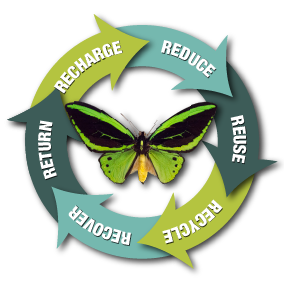

 |  |  |
|---|
Protecting our environment
for the future
Renewable resources
Protecting the environment
Creating new resources
Recycling
Recycling is the process of converting waste materials into new materials and objects. This can reduce the need for traditional waste disposal such as land fill or burning. Recycling reduces waste of useful materials and diminishes the need for fresh raw materials. This helps reduce air pollution and water pollution. Recylable materials include paper products, glass, metal, plastics, textiles and electronics as well as organic waste.
Reduce
The most effective way to reduce waste is to not create it in the first place. Making new products requires energy and raw materials, which must be extracted from the earth. The products must be fabricated then transported to wherever they will be sold. As a result, reduction and reuse are the most effective ways you can save natural resources, protect the environment and save money.
Look for products that use less packaging. When manufacturers make their products with less packaging, they use less raw material. This reduces waste and costs. These extra savings can be passed along to the consumer. Buying in bulk, for example, can reduce packaging and save money.
Reuse
You can find everything from clothes to building materials at specialised reuse centres and thrift shops. Often, used items are less expensive and just as good as new.
Where possible, buy reusable over disposable items and maintain and REPAIR products, like clothing, tires and appliances, so that they won't have to be thrown out and replaced as frequently and save money.
Consider renting or sharing items that are used infrequently, like books, tools or furniture and save more money.
Recover
Resource recovery is using wastes as an input material to create valuable products. The aim is to reduce the amount of waste generated, therefore reducing the need for landfill space. Also, the maximum benefit from the wastes should be extracted. Resource recovery delays the need to use raw materials in the manufacturing process. For example, plastic, paper, aluminium, glass and metal can be used to make new products.

Recycle
Recycling includes the three steps below, which create a continuous loop, represented by the familiar recycling symbol.
-
Collection and processing, including curbside collection, drop-off centres, and deposit or refund programs.
-
Manufacturing. Common household items that contain recycled materials include newspapers and paper towels, aluminum, plastic, and glass soft drink containers and steel cans.
-
Purchasing new products made from recycled materials. Look for products that can be easily recycled and products that contain recycled content.
Return
"Return and Earn" programs encourage people to bring recyclable products to recycling centres. Once sorted and cleaned, this provides the raw material for recycled products and materials.
Recharge
Battery recycling is a recycling activity that aims to reduce the number of batteries being disposed as municipal solid waste. Batteries contain a number of heavy metals and toxic chemicals and disposing them by the same process as regular trash has raised concerns over soil contamination and water pollution.
-
Recycling one aluminium can saves enough energy to run a TV for three hours.
-
350,000 aluminium cans are produced every minute!
-
More aluminium goes into beverage cans than any other product.
-
Once an aluminium can is recycled, it can be part of a new can within six weeks.
-
Every month, we throw out enough glass bottles and jars to fill up a giant skyscraper. All of these jars are recyclable!
-
The energy saved from recycling one glass bottle can run a 100-watt light bulb for four hours. It also causes 20% less air pollution and 50% less water pollution than when a new bottle is made from raw materials.
Recycling fun facts
-
A modern glass bottle would take 4000 years or more to decompose -- and even longer if it's in the landfill.
-
If all our newspaper was recycled, we could save about 250,000,000 trees each year!
-
The amount of wood and paper we throw away each year is enough to heat 50,000,000 homes for 20 years.
-
Plastic bags and other plastic garbage thrown into the ocean kill as many as 1,000,000 sea creatures every year!
-
A single quart of motor oil, if disposed of improperly, can contaminate up to 2,000,000 gallons of fresh water.